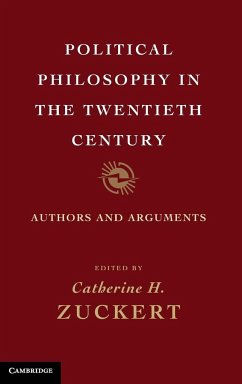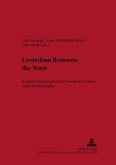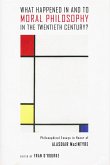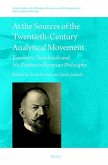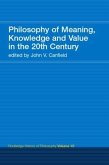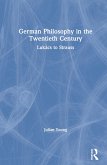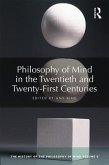Political Philosophy in the Twentieth Century
Herausgeber: Zuckert, Catherine
Political Philosophy in the Twentieth Century
Herausgeber: Zuckert, Catherine
- Gebundenes Buch
- Merkliste
- Auf die Merkliste
- Bewerten Bewerten
- Teilen
- Produkt teilen
- Produkterinnerung
- Produkterinnerung
Well-known scholars present the arguments of individual political philosophers they know and admire.
Andere Kunden interessierten sich auch für
![«Leviathan-» Between the Wars «Leviathan-» Between the Wars]() «Leviathan-» Between the Wars60,50 €
«Leviathan-» Between the Wars60,50 €![What Happened in and to Moral Philosophy in the Twentieth Century? What Happened in and to Moral Philosophy in the Twentieth Century?]() What Happened in and to Moral Philosophy in the Twentieth Century?70,99 €
What Happened in and to Moral Philosophy in the Twentieth Century?70,99 €![At the Sources of the Twentieth-Century Analytical Movement At the Sources of the Twentieth-Century Analytical Movement]() At the Sources of the Twentieth-Century Analytical Movement176,99 €
At the Sources of the Twentieth-Century Analytical Movement176,99 €![Philosophy of Meaning, Knowledge and Value in the Twentieth Century Philosophy of Meaning, Knowledge and Value in the Twentieth Century]() John V. Canfield (ed.)Philosophy of Meaning, Knowledge and Value in the Twentieth Century72,99 €
John V. Canfield (ed.)Philosophy of Meaning, Knowledge and Value in the Twentieth Century72,99 €![How Theology Shaped Twentieth-Century Philosophy How Theology Shaped Twentieth-Century Philosophy]() Frank B FarrellHow Theology Shaped Twentieth-Century Philosophy131,99 €
Frank B FarrellHow Theology Shaped Twentieth-Century Philosophy131,99 €![German Philosophy in the Twentieth Century German Philosophy in the Twentieth Century]() Julian YoungGerman Philosophy in the Twentieth Century204,99 €
Julian YoungGerman Philosophy in the Twentieth Century204,99 €![Philosophy of Mind in the Twentieth and Twenty-First Centuries Philosophy of Mind in the Twentieth and Twenty-First Centuries]() Philosophy of Mind in the Twentieth and Twenty-First Centuries201,99 €
Philosophy of Mind in the Twentieth and Twenty-First Centuries201,99 €-
-
-
Well-known scholars present the arguments of individual political philosophers they know and admire.
Hinweis: Dieser Artikel kann nur an eine deutsche Lieferadresse ausgeliefert werden.
Hinweis: Dieser Artikel kann nur an eine deutsche Lieferadresse ausgeliefert werden.
Produktdetails
- Produktdetails
- Verlag: Cambridge University Press
- Seitenzahl: 292
- Erscheinungstermin: 10. November 2011
- Englisch
- Abmessung: 235mm x 157mm x 20mm
- Gewicht: 577g
- ISBN-13: 9781107006225
- ISBN-10: 1107006228
- Artikelnr.: 33626757
- Herstellerkennzeichnung
- Libri GmbH
- Europaallee 1
- 36244 Bad Hersfeld
- gpsr@libri.de
- Verlag: Cambridge University Press
- Seitenzahl: 292
- Erscheinungstermin: 10. November 2011
- Englisch
- Abmessung: 235mm x 157mm x 20mm
- Gewicht: 577g
- ISBN-13: 9781107006225
- ISBN-10: 1107006228
- Artikelnr.: 33626757
- Herstellerkennzeichnung
- Libri GmbH
- Europaallee 1
- 36244 Bad Hersfeld
- gpsr@libri.de
Introduction Catherine H. Zuckert; Part I. The Three Basic Alternatives in
the Early Twentieth Century: 1. John Dewey: philosophy as theory of
education David Fott; 2. Carl Schmitt political theology and the concept of
the political Tracy B. Strong; 3. Antonio Gramsci: liberation begins with
critical thinking Joseph Buttigieg; Part II. Émigré Responses to World War
II: 4. Philosophy as a way of life Steven B. Smith; 5. The philosopher's
vocation: the Voegelinian paradigm Ellis Sandoz; 6. Yves R. Simon: a
philosopher's quest for science and prudence Walter Nicgorski; 7. Hannah
Arendt: from philosophy to politics Dana R. Villa; Part III. The Revival of
Liberal Political Philosophy: 8. Friedrich Hayek on the nature of social
order and law Eric Mack; 9. Michael Oakeshott: the philosophical skeptic in
an impatient age Timothy Fuller; 10. Moral pluralism and liberal democracy:
Isaiah Berlin's heterodox liberalism William Galston; 11. H. L. A. Hart: a
twentieth-century Oxford political philosopher John M. Finnis; Part IV.
Critiques of Liberalism: 12. John Rawls and the task of political
philosophy Paul Weithman; 13. Richard Rorty: liberalism, irony, and social
hope Michael Bacon; 14. Jean-Paul Sartre: 'in the soup' William Leon
McBride; 15. Michel Foucault: an ethical politics of care of self and
others Alan Milchman and Alan Rosenberg; 16. Jürgen Habermas: postwar
German critical debates and the making of a theorist William E. Scheuerman;
17. Alasdair MacIntyre on political thinking and the tasks of politics
Arthur Madigan, SJ; 18. Another philosopher-citizen: the political
philosophy of Charles Taylor Ruth Abbey.
the Early Twentieth Century: 1. John Dewey: philosophy as theory of
education David Fott; 2. Carl Schmitt political theology and the concept of
the political Tracy B. Strong; 3. Antonio Gramsci: liberation begins with
critical thinking Joseph Buttigieg; Part II. Émigré Responses to World War
II: 4. Philosophy as a way of life Steven B. Smith; 5. The philosopher's
vocation: the Voegelinian paradigm Ellis Sandoz; 6. Yves R. Simon: a
philosopher's quest for science and prudence Walter Nicgorski; 7. Hannah
Arendt: from philosophy to politics Dana R. Villa; Part III. The Revival of
Liberal Political Philosophy: 8. Friedrich Hayek on the nature of social
order and law Eric Mack; 9. Michael Oakeshott: the philosophical skeptic in
an impatient age Timothy Fuller; 10. Moral pluralism and liberal democracy:
Isaiah Berlin's heterodox liberalism William Galston; 11. H. L. A. Hart: a
twentieth-century Oxford political philosopher John M. Finnis; Part IV.
Critiques of Liberalism: 12. John Rawls and the task of political
philosophy Paul Weithman; 13. Richard Rorty: liberalism, irony, and social
hope Michael Bacon; 14. Jean-Paul Sartre: 'in the soup' William Leon
McBride; 15. Michel Foucault: an ethical politics of care of self and
others Alan Milchman and Alan Rosenberg; 16. Jürgen Habermas: postwar
German critical debates and the making of a theorist William E. Scheuerman;
17. Alasdair MacIntyre on political thinking and the tasks of politics
Arthur Madigan, SJ; 18. Another philosopher-citizen: the political
philosophy of Charles Taylor Ruth Abbey.
Introduction Catherine H. Zuckert; Part I. The Three Basic Alternatives in
the Early Twentieth Century: 1. John Dewey: philosophy as theory of
education David Fott; 2. Carl Schmitt political theology and the concept of
the political Tracy B. Strong; 3. Antonio Gramsci: liberation begins with
critical thinking Joseph Buttigieg; Part II. Émigré Responses to World War
II: 4. Philosophy as a way of life Steven B. Smith; 5. The philosopher's
vocation: the Voegelinian paradigm Ellis Sandoz; 6. Yves R. Simon: a
philosopher's quest for science and prudence Walter Nicgorski; 7. Hannah
Arendt: from philosophy to politics Dana R. Villa; Part III. The Revival of
Liberal Political Philosophy: 8. Friedrich Hayek on the nature of social
order and law Eric Mack; 9. Michael Oakeshott: the philosophical skeptic in
an impatient age Timothy Fuller; 10. Moral pluralism and liberal democracy:
Isaiah Berlin's heterodox liberalism William Galston; 11. H. L. A. Hart: a
twentieth-century Oxford political philosopher John M. Finnis; Part IV.
Critiques of Liberalism: 12. John Rawls and the task of political
philosophy Paul Weithman; 13. Richard Rorty: liberalism, irony, and social
hope Michael Bacon; 14. Jean-Paul Sartre: 'in the soup' William Leon
McBride; 15. Michel Foucault: an ethical politics of care of self and
others Alan Milchman and Alan Rosenberg; 16. Jürgen Habermas: postwar
German critical debates and the making of a theorist William E. Scheuerman;
17. Alasdair MacIntyre on political thinking and the tasks of politics
Arthur Madigan, SJ; 18. Another philosopher-citizen: the political
philosophy of Charles Taylor Ruth Abbey.
the Early Twentieth Century: 1. John Dewey: philosophy as theory of
education David Fott; 2. Carl Schmitt political theology and the concept of
the political Tracy B. Strong; 3. Antonio Gramsci: liberation begins with
critical thinking Joseph Buttigieg; Part II. Émigré Responses to World War
II: 4. Philosophy as a way of life Steven B. Smith; 5. The philosopher's
vocation: the Voegelinian paradigm Ellis Sandoz; 6. Yves R. Simon: a
philosopher's quest for science and prudence Walter Nicgorski; 7. Hannah
Arendt: from philosophy to politics Dana R. Villa; Part III. The Revival of
Liberal Political Philosophy: 8. Friedrich Hayek on the nature of social
order and law Eric Mack; 9. Michael Oakeshott: the philosophical skeptic in
an impatient age Timothy Fuller; 10. Moral pluralism and liberal democracy:
Isaiah Berlin's heterodox liberalism William Galston; 11. H. L. A. Hart: a
twentieth-century Oxford political philosopher John M. Finnis; Part IV.
Critiques of Liberalism: 12. John Rawls and the task of political
philosophy Paul Weithman; 13. Richard Rorty: liberalism, irony, and social
hope Michael Bacon; 14. Jean-Paul Sartre: 'in the soup' William Leon
McBride; 15. Michel Foucault: an ethical politics of care of self and
others Alan Milchman and Alan Rosenberg; 16. Jürgen Habermas: postwar
German critical debates and the making of a theorist William E. Scheuerman;
17. Alasdair MacIntyre on political thinking and the tasks of politics
Arthur Madigan, SJ; 18. Another philosopher-citizen: the political
philosophy of Charles Taylor Ruth Abbey.

